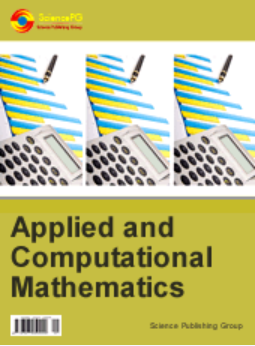Asymptotic Behavior of Multivariate Extremes Geometric Type Random Variables
IF 4.3
2区 数学
Q1 MATHEMATICS, APPLIED
引用次数: 0
Abstract
This document was an opportunity for us to measure the contributions of researchers on the asymptotic behavior of the extremes random variables. Beyond the available results, we have proposed an analysis of the behavior of the extremes of random variables of geometric type. We succeeded in determining a subsequence which allows us to establish a convergence in law of the extremes of this type of random variable while passing by the determination of a speed of convergence. We then exposed the limited law which results from it then we called upon the copulas of the extreme values to propose a joint limited law for two independent samples of random variables of geometric type. These results will allow us to analyze, in a document, not only the convergence in moment of order of the other extremes of the random variables of geometric type but also the general asymptotic behavior of the extremes of a serie of random variables with integer value. This document was an opportunity for us to measure the contributions of researchers on the asymptotic behavior of the extremes random variables. Beyond the available results, we have proposed an analysis of the behavior of the extremes of random variables of geometric type. We first made the case of the fact that the random variables of geometric type could be constructed from the random variables of exponential distribution and that they were not only integer variables but also that in general there were no sequences standards that allowed their extremes to converge. To do this, we first built a convergent ϕ(k) subsequence which we then used to define a geometric type Tϕ(k) subsequence of random variables. We have also proved the convergence in distribution of the extremes of the random variables Tϕ(k). We have also exhibited the resulting limit law. Finally, in this document, we have dealt with the multivariate case of random variables of geometric type. We considered two independent samples of random variables of geometric types. Using a copula of extreme values, in particular the logistic copula, we proposed a joint limit distribution of two independent samples of subsequences of geometric type random variables. We then exposed the limited law which results from it then we called upon the copulas of the extreme values to propose a joint limited law for two independent samples of random variables of geometric type.多元极值几何型随机变量的渐近性质
这份文件是一个机会,让我们衡量研究人员的贡献在极端随机变量的渐近行为。在已有的结果之外,我们提出了对几何型随机变量的极值行为的分析。我们成功地确定了一个子序列,使我们能够在确定收敛速度的同时,根据这类随机变量的极值律建立收敛性。然后揭示了由此得出的极限律,然后利用极值的连数式提出了两个独立的几何型随机变量样本的联合极限律。这些结果将使我们不仅可以分析几何型随机变量的其他极值在阶矩上的收敛性,而且可以分析一系列整数值随机变量的极值的一般渐近行为。这份文件是一个机会,让我们衡量研究人员的贡献在极端随机变量的渐近行为。在已有的结果之外,我们提出了对几何型随机变量的极值行为的分析。我们首先提出了几何型随机变量可以由指数分布的随机变量构造而成,它们不仅是整数变量,而且一般不存在允许其极值收敛的序列标准。为此,我们首先构建了一个收敛的ϕ(k)子序列,然后用它来定义随机变量的几何类型Tϕ(k)子序列。我们还证明了随机变量tφ (k)的极值分布的收敛性。我们也展示了所得的极限定律。最后,在本文中,我们处理了几何型随机变量的多元情况。我们考虑了几何类型随机变量的两个独立样本。利用极值的联结,特别是逻辑联结,给出了几何型随机变量子序列的两个独立样本的联合极限分布。然后揭示了由此得出的极限律,然后利用极值的连数式提出了两个独立的几何型随机变量样本的联合极限律。
本文章由计算机程序翻译,如有差异,请以英文原文为准。
求助全文
约1分钟内获得全文
求助全文
来源期刊
CiteScore
8.80
自引率
5.00%
发文量
18
审稿时长
6 months
期刊介绍:
Applied and Computational Mathematics (ISSN Online: 2328-5613, ISSN Print: 2328-5605) is a prestigious journal that focuses on the field of applied and computational mathematics. It is driven by the computational revolution and places a strong emphasis on innovative applied mathematics with potential for real-world applicability and practicality.
The journal caters to a broad audience of applied mathematicians and scientists who are interested in the advancement of mathematical principles and practical aspects of computational mathematics. Researchers from various disciplines can benefit from the diverse range of topics covered in ACM. To ensure the publication of high-quality content, all research articles undergo a rigorous peer review process. This process includes an initial screening by the editors and anonymous evaluation by expert reviewers. This guarantees that only the most valuable and accurate research is published in ACM.

 求助内容:
求助内容: 应助结果提醒方式:
应助结果提醒方式:


